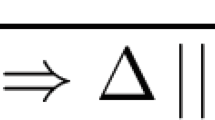Abstract
We prove completeness and decidability results for the temporal logic CTL in Coq/Ssreflect. Our main result is a constructive proof that for every formula one can obtain either a finite model satisfying the formula or a proof in a Hilbert system certifying the unsatisfiability of the formula. The small model property of CTL and completeness of the Hilbert system follow as corollaries. Our proofs mostly refine the mathematical proofs given by Emerson and Halpern. One important deviation is our use of an inductive semantics for CTL to avoid reasoning about infinite paths. On finite models the inductive semantics agrees constructively with the standard path semantics. The proof amounts to the verification of a simple model checking algorithm. For general models, the agreement between the inductive semantics and the path semantics requires excluded middle and dependent choice.




Similar content being viewed by others
Notes
We also write V for the finite type of elements of V
We convert finite sets to lists as required.
References
Baier, C., Katoen, J.P.: Principles of Model Checking. MIT Press, Cambridge (2008)
Ben-Ari, M., Pnueli, A., Manna, Z.: The temporal logic of branching time. Acta Inf. 20(3), 207–226 (1983)
Bertot, Y., Gonthier, G., Biha, S.O., Pasca, I.: Canonical big operators. In: O.A. Mohamed, C. Muñoz, S. Tahar (eds.) Theorem Proving in Higher Order Logics (TPHOLs 2008), LNCS, vol. 5170, pp. 86–101. Springer (2008)
Brünnler, K., Lange, M.: Cut-free sequent systems for temporal logic. J. Log. Algebr. Program. 76(2), 216–225 (2008)
Clarke, E.M., Emerson, E.A., Sistla, A.P.: Automatic verification of finite-state concurrent systems using temporal logic specifications. ACM Trans. Program. Lang. Syst. 8(2), 244–263 (1986)
Doczkal, C., Smolka, G.: Coq formalization accompanying this paper (Online Resource 1). www.ps.uni-saarland.de/extras/jaritp14/
Doczkal, C., Smolka, G.: Completeness and decidability results for CTL in Coq. In: G. Klein, R. Gamboa (eds.) Interactive Theorem Proving (ITP 2014), LNAI, vol. 8558, pp. 226–241. Springer (2014)
Emerson, E.A.: Temporal and modal logic. In: van Leeuwen, J. (ed.) Handbook of Theoretical Computer Science: Formal Models and Sematics, vol. B, pp. 995–1072. Elsevier, Amsterdam (1990)
Emerson, E.A.: The beginning of model checking: a personal perspective. In: Grumberg, O., Veith, H. (eds.) 25 Years of Model Checking, LNCS, vol. 5000, pp. 27–45. Springer, Berlin (2008)
Emerson, E.A., Clarke, E.M.: Characterizing correctness properties of parallel programs using fixpoints. In: de Bakker, J.W., van Leeuwen, J. (eds.) Automata, Languages and Programming, LNCS, vol. 85, pp. 169–181. Springer, Berlin (1980)
Emerson, E.A., Clarke, E.M.: Using branching time temporal logic to synthesize synchronization skeletons. Sci. Comput. Program. 2(3), 241–266 (1982)
Emerson, E.A., Halpern, J.Y.: Decision procedures and expressiveness in the temporal logic of branching time. J. Comput. Syst. Sci. 30(1), 1–24 (1985)
Emerson, E.A., Lei, C.: Efficient model checking in fragments of the propositional mu-calculus (extended abstract). In: Proceedings, Symposium on Logic in Computer Science, 16–18 June 1986, Cambridge, Massachusetts, USA, pp. 267–278. IEEE Computer Society (1986)
Escardó, M.: Infinite sets that satisfy the principle of omniscience in any variety of constructive mathematics. J. Symb. Log. 78(3), 764–784 (2013)
Fischer, M.J., Ladner, R.E.: Propositional dynamic logic of regular programs. J. Comput. Syst. Sci. 18(2), 194–211 (1979)
Fitting, M.: Modal proof theory. In: Blackburn, P., van Benthem, J., Wolter, F. (eds.) Handbook of Modal Logic, Studies in Logic and Practical Reasoning, vol. 3, pp. 85–138. Elsevier, Amsterdam (2007)
Gonthier, G., Mahboubi, A., Rideau, L., Tassi, E., Théry, L.: A modular formalisation of finite group theory. In: Schneider, K., Brandt, J. (eds.) Theorem Proving in Higher Order Logics (TPHOLs 2007), LNCS, vol. 4732, pp. 86–101. Springer, Berlin (2007)
Gonthier, G., Mahboubi, A., Tassi, E.: A small scale reflection extension for the Coq system. Research report RR-6455, INRIA Saclay (2008)
Herbelin, H.: A constructive proof of dependent choice, compatible with classical logic. In: 27th Annual ACM/IEEE Symposium on Logic in Computer Science (LICS), pp. 365–374. IEEE Computer Society (2012)
Kaminski, M., Schneider, T., Smolka, G.: Correctness and worst-case optimality of Pratt-style decision procedures for modal and hybrid logics. In: Brünnler, K., Metcalfe, G. (eds.) Automated Reasoning with Analytic Tableaux and Related Methods (TABLEAUX 2011), LNAI, vol. 6793, pp. 196–210. Springer, Berlin (2011)
Kaminski, M., Smolka, G.: Terminating tableaux for hybrid logic with eventualities. In: Giesl, J., Hähnle, R. (eds.) Automated Reasoning (IJCAR 2010), LNCS, vol. 6173, pp. 240–254. Springer, Berlin (2010)
Kaminski, M., Smolka, G.: A goal-directed decision procedure for hybrid PDL. J. Autom. Reason. 52(4), 407–450 (2014)
Lange, M., Stirling, C.: Focus games for satisfiability and completeness of temporal logic. In: 16th Annual ACM/IEEE Symposium on Logic in Computer Science (LICS), pp. 357–365. IEEE Computer Society (2001)
Pratt, V.R.: Models of program logics. In: 20th Annual Symposium on Foundations of Computer Science (FOCS’79), pp. 115–122. IEEE Computer Society (1979)
Smullyan, R.M.: First-Order Logic. Springer, Berlin (1968)
Sozeau, M.: A new look at generalized rewriting in type theory. J. Form. Reason. 2(1), 41–62 (2009)
The Coq Development Team. http://coq.inria.fr
Author information
Authors and Affiliations
Corresponding author
Electronic supplementary material
Below is the link to the electronic supplementary material.
Rights and permissions
About this article
Cite this article
Doczkal, C., Smolka, G. Completeness and Decidability Results for CTL in Constructive Type Theory. J Autom Reasoning 56, 343–365 (2016). https://doi.org/10.1007/s10817-016-9361-9
Received:
Accepted:
Published:
Issue Date:
DOI: https://doi.org/10.1007/s10817-016-9361-9



